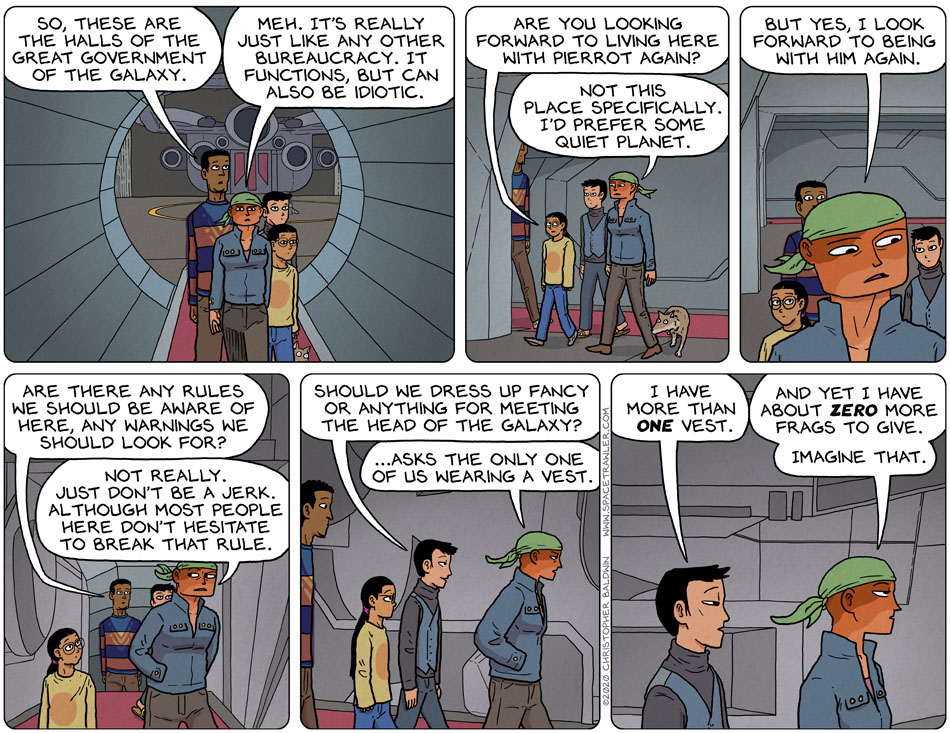Spacetrawler, audio version For the blind or visually impaired, July 16, 2020.

I think that anyone who tries to live by the adage “don’t be a jerk” is familiar with this conundrum.
Spacetrawler, audio version For the blind or visually impaired, July 16, 2020.

I think that anyone who tries to live by the adage “don’t be a jerk” is familiar with this conundrum.
There are thousands of different cultures and species. Unless they really studied the people they deal with, they wouldn’t recognize anything as fancy, or would.
“Ooooooooooooooh, aren’t WE fancy? Clothes!”
Hmm. This brings up the point that the GOB only covers the galaxy. I suppose even Very Fast Ships would take too long to travel the 2.5 million light years to even the next galaxy over, Andromeda.
That hasn’t stopped Sergeant Schlock!
The Local Group is controlled by the Nine Unknown.
SF writers like to have Galactic Empires because things like “Local Cluster Empires” just sound dull. The scale of these things is not easy for the human brain to wrap around, so the Emperor of the Galaxy sounds cool.
“Government of the Galaxy.” Really? All 100 billion star systems? How exactly does that work? It’s sort of like Balboa wading into the surf and claiming the Pacific Ocean.
I suspect most of the GOB’s bureaucracy is dedicated to concealing how little influence they actually have.
In some of my fiction there are star empires but of varying density and control. Nobody can control 100 million star systems unless they are the Kútùllû. But that is far different from humans doing it.
It might be easier with those who wish to confederate and those who are very harsh with planets who want to go separately from a ruthless empire kind of set up. The logistics would be exhausting dependent upon the number of systems, the types, the means of the empire in question concerning how to keep the systems in line or not.
After years of staffing the American Antarctic base, the scientists in charge determined that the single factor that would reduce stress among a group stuck underground in a small space was individual messiness. People who are not highly organized tend not to be bothered by other people’s messes, and so they get along better together longer. I wouldn’t be surprised to find most of the GOB delegates of similar mental disposition, regardless of their political aims.
As we have seen, a lot of those aims are never revealed, are pursued with allies and against antagonists with little sign of their actual involvement, and oftentimes they seem to be the activity they pursue most of the time. So I am not surprised to find most of the GOB in casual dress, wandering about the station talking to people (or ‘people-like creatures’) almost at random, with occasionally one of them disappearing or showing up on an unscheduled spacewalk sans spacesuit. Really, like a more laid-back United Nations located inside a Moebius storyline.
What you say about personal neediness is interesting… and, to an extent, I can see how that could be true. Except my personal experience had been otherwise..
Having lived in some small places, I can assure you that messiness is a bad way to live: you rarely know what is where, things get stacked or piled almost as quickly as things leave your grasp… and dirty laundry stinks up the place within days. There’d be a big change in policy within a week.
To me there is a difference between being messy with papers on your desk and letting the dishes pile up for a day or two (and then when you have a block of time you do them), and lack of personal hygiene (as in not doing laundry.)
an old quote:
Organized people are just to lazy to look for things.
Admitted, the margin of messiness was a consideration. Total slobs can’t work together because they can’t find their work, or remember the steps to follow to complete it. But people who tend to throw their underwear on the bunk to deal with later, and still manage to get their work done and put tools back where they belong, get along better with similar people.
Remember, this is Antarctica, in the middle of winter, which means darkness 24 hours a day from March to October, and going out requires suiting-up as if you were walking on the moon. Can’t be sloppy there, or you’ll end up part of the frozen landscape, waiting to be chipped out and flown home for defrosting. I imagine a good deal of experience went into making this determination of who got along best with who, and it likely was not comfortable for all concerned. For all I know, the people who got along best were the ones who learned to be sloppy and not be bothered by other people’s personal messes. There’s a degree of adaptability here that I don’t believe was measured. Could have been too finicky for people to track.
You see how this works.
I do! Long ago, I worked for Lockheed Martin, knew a few ppl down that way. In fact, I think I know someone down there now (haven’t talked to him in many ages).
And yes. There are many degrees of “messiness”. It always seemed to me that the best rule is clean up after yourself. If that is done by everyone (within a time frame), the only arguments will be over who wins the Neatness Prize (lol)
Christopher?
Panel four, where is E’s right hand?
@Steven, ha! Well, it’s in her pocket. But I’ll adjust it to make it clear, I totally see what youre seeing.